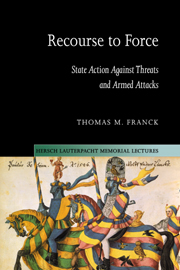Book contents
- Frontmatter
- Contents
- Acknowledgments
- 1 The United Nations' capacity for adapting to radical changes of circumstance
- 2 Use of force by the United Nations
- 3 The original parameters of self-defense
- 4 Self-defence against state-sponsored terrorists and infiltrators
- 5 Self-defense against ideological subversion
- 6 Self-defense against attacks on citizens abroad
- 7 Anticipatory self-defense
- 8 Countermeasures and self-help
- 9 The “purely humanitarian” intervention
- 10 What, eat the cabin boy? Uses of force that are illegal but justifiable
- Index
1 - The United Nations' capacity for adapting to radical changes of circumstance
Published online by Cambridge University Press: 17 July 2009
- Frontmatter
- Contents
- Acknowledgments
- 1 The United Nations' capacity for adapting to radical changes of circumstance
- 2 Use of force by the United Nations
- 3 The original parameters of self-defense
- 4 Self-defence against state-sponsored terrorists and infiltrators
- 5 Self-defense against ideological subversion
- 6 Self-defense against attacks on citizens abroad
- 7 Anticipatory self-defense
- 8 Countermeasures and self-help
- 9 The “purely humanitarian” intervention
- 10 What, eat the cabin boy? Uses of force that are illegal but justifiable
- Index
Summary
The legacy of Sir Hersch Lauterpacht
When, in 1933, Judge Lauterpacht wrote The Function of Law in the International Community, he reasoned from first principles that the world's legal system must be grounded in an absolute rule: “There shall be no violence” by states. He described this as the “primordial duty of the law.”
At the same time, he concluded prophetically that the League of Nations' Covenant would fall far short of establishing that rule in law, let alone in fact. It was full of loopholes for aggressors and their appeasers. Loopholes drew his scorn. “It is impossible,” he observed, “in the scheme of things devised to secure the reign of law, to provide machinery calculated to disregard the law …”
Loopholes, as we shall see, are the subject of this study, which will argue that they can be bad, but that they also have an important role to play in saving law from itself.
After the Second World War, with Lauterpacht's participation, the Nuremberg tribunal was called upon to draw a much brighter line than hitherto against aggression. So, too, at Dumbarton Oaks and San Francisco, a UN Charter was written that makes absolute the obligation of states not to resort to force against each other and to resist collectively any breach of this prohibition.
New remedies, as we know from medicine, tend to produce unexpected side effects. Article 2(4) of the Charter seemingly cures the Covenant's normative ambiguities regarding states' “threat or use of force” against each other.
- Type
- Chapter
- Information
- Recourse to ForceState Action against Threats and Armed Attacks, pp. 1 - 19Publisher: Cambridge University PressPrint publication year: 2002



